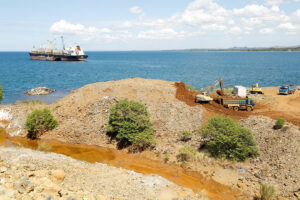By Beatriz Marie D. Cruz, Reporter
THE HOUSE of Representatives on Tuesday passed on third and final reading a bill that seeks to establish a new fiscal regime for the Philippine mining industry by imposing margin-based royalties and windfall profit tax on large-scale miners.
House Bill (HB) No. 8937, which congressmen approved past midnight, is supposed to simplify the mining tax system and make the Philippines competitive with other countries in attracting investments into the capital-intensive sector.
Under the measure, large-scale metallic mining operations inside mineral reservations will pay the government 4% of their gross output.
Margin-based royalties on income from metallic operations will be imposed on those outside mineral reservation areas. For instance, miners with margins of 1% up to 10% would be subject to a 1% rate. This royalty rate can go up to as high as 5% for those with margins above 70%.
Meanwhile, small-scale miners will be slapped royalties equivalent to a 10th of 1% of their gross output.
Under the bill, mining income will be subjected to a margin-based windfall profits tax. Miners with margins of more than 35% up to 40% would face a tax rate of 1%, while those with margins of more than 80% will be imposed a 10% rate.
“While we maintain that the current mining tax regime is already substantial (we are already taxed higher than far bigger mining countries such as Indonesia, the world’s top nickel producer; as well as Chile and Peru, biggest copper producers globally), we are relieved that the additional tax burden on the industry being proposed in HB 8937 is not punishingly high,” Chamber of Mines of the Philippines (CoMP) Vice-Chairman Gerard H. Brimo said in a Viber chat.
Mining companies in the country currently must pay corporate income tax, excise tax, royalty, local business tax, real property tax, and fees to indigenous communities.
However, Party-list Rep. Arlene D. Brosas, who was one of four solons who voted against HB 8937, said tax collection from mining firms “will never compensate for the long-term disastrous implications” of large mining operations in the country.
“The supposed tax intake from the mining industry cannot also be a substitute for foregone mineral ores which are exported to other countries, and which will never be taken back,” she said.
Maya Quirino, advocacy coordinator of research group Legal Rights and Natural Resources Center said mining tax rates in mineral reservations should be maintained, instead of reduced.
“On the other hand, the proposed graduated tax thresholds for windfall profits require stringent monitoring mechanisms to prevent companies from underreporting revenue. Taxes should be applied on outputs instead of revenue,” she said in a Viber chat.
The bill approved by the House on final reading is vastly different from the Department of Finance (DoF)-proposed version that sought to bring the country’s effective tax rate on mining (considering all taxes) to 51%, up from 38% under the current system.
The DoF-backed version also sought to impose a royalty tax of 5% on the market value of gross output of all large-scale mining operations, and a 10% export tax on the market value of mineral ore exports.
Last week, the Legislative-Executive Development Advisory Council included the mining fiscal regime bill in the common legislative agenda of the 19th Congress.
In his State of the Nation Address last July, President Ferdinand R. Marcos, Jr. said the mining fiscal regime is one of his administration’s priority measures.
